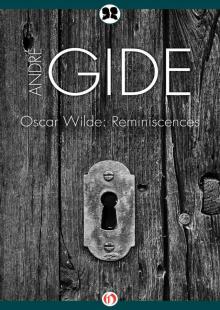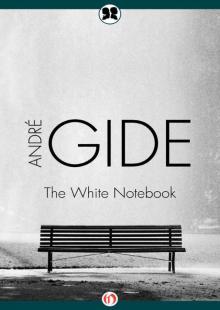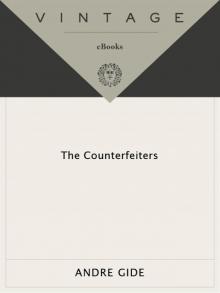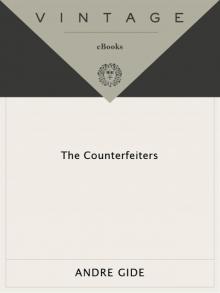- Home
- André Gide
The Counterfeiters: A Novel Page 18
The Counterfeiters: A Novel Read online
Page 18
“But I thought you wanted to abandon reality.”
“My novelist wants to abandon it; but I shall continually bring him back to it. In fact that will be the subject; the struggle between the facts presented by reality and the ideal reality.”
The illogical nature of his remarks was flagrant—painfully obvious to everyone. It was clear that Edouard housed in his brain two incompatible requirements and that he was wearing himself out in the desire to reconcile them.
“Have you got on far with it?” asked Sophroniska politely.
“It depends on what you mean by far. To tell the truth, of the actual book not a line has been written. But I have worked at it a great deal. I think of it every day and incessantly. I work at it in a very odd manner, as I’ll tell you. Day by day in a note-book, I note the state of the novel in my mind; yes, it’s a kind of diary that I keep as one might do of a child.… That is to say, that instead of contenting myself with resolving each difficulty as it presents itself (and every work of art is only the sum or the product of the solutions of a quantity of small difficulties), I set forth each of these difficulties and study it. My note-book contains, as it were, a running criticism of my novel—or rather of the novel in general. Just think how interesting such a note-book kept by Dickens or Balzac would be; if we had the diary of the Education Sentimentale or of The Brothers Karamazof!—the story of the work—of its gestation! How thrilling it would be … more interesting than the work itself.… ”
Edouard vaguely hoped that someone would ask him to read these notes. But not one of the three showed the slightest curiosity. Instead:
“My poor friend,” said Laura, with a touch of sadness, “it’s quite clear that you’ll never write this novel of yours.”
“Well, let me tell you,” cried Edouard impetuously, “that I don’t care. Yes, if I don’t succeed in writing the book, it’ll be because the history of the book will have interested me more than the book itself—taken the book’s place; and it’ll be a very good thing.”
“Aren’t you afraid, when you abandon reality in this way, of losing yourself in regions of deadly abstraction and of making a novel about ideas instead of about human beings?” asked Sophroniska kindly.
“And even so!” cried Edouard with redoubled energy. “Must we condemn the novel of ideas because of the groping and stumbling of the incapable people who have tried their hands at it? Up till now we have been given nothing but novels with a purpose parading as novels of ideas. But that’s not it at all, as you may imagine. Ideas … ideas, I must confess, interest me more than men—interest me more than anything. They live; they fight; they perish like men. Of course it may be said that our only knowledge of them is through men, just as our only knowledge of the wind is through the reeds that it bends; but all the same the wind is of more importance than the reeds.”
“The wind exists independently of the reed,” ventured Bernard. His intervention made Edouard, who had long been waiting for it, start afresh with renewed spirit:
“Yes, I know; ideas exist only because of men; but that’s what’s so pathetic; they live at their expense.”
Bernard had listened to all this with great attention; he was full of scepticism and very near taking Edouard for a mere dreamer; but during the last few moments he had been touched by his eloquence and had felt his mind waver in its breath; “But,” thought Bernard, “the reed lifts its head again as soon as the wind has passed.” He remembered what he had been taught at school—that man is swayed by his passions and not by ideas. In the mean time Edouard was going on:
“What I should like to do is something like the art of fugue writing. And I can’t see why what was possible in music should be impossible in literature.… ”
To which Sophroniska rejoined that music is a mathematical art, and moreover that Bach, by dealing only with figures and by banishing all pathos and all humanity, had achieved an abstract chef d’œuvre of boredom, a kind of astronomical temple, open only to the few rare initiated. Edouard at once protested that, for his part, he thought the temple admirable, and considered it the apex and crowning point of all Bach’s career.
“After which,” added Laura, “people were cured of the fugue for a long time to come. Human emotion, when it could no longer inhabit it, sought a dwelling place elsewhere.”
The discussion tailed off in an unprofitable argument. Bernard, who until then had kept silent, but who was beginning to fidget on his chair, at last could bear it no longer; with extreme, even exaggerated deference, as was his habit whenever he spoke to Edouard, but with a kind of sprightliness, which seemed to make a jest of his deference:
“Forgive me, sir,” said he, “for knowing the title of your book, since I learnt it through my own indiscretion—which however you have been kind enough to pass over. But the title seemed to me to announce a story.”
“Oh, tell us what the title is!” said Laura.
“Certainly, my dear Laura, if you wish it.… But I warn you that I may possibly change it. I am afraid it’s rather deceptive.… Well, tell it them, Bernard.”
“May I?… The Counterfeiters,” said Bernard. “But now you tell us—who are these Counterfeiters?”
“Oh dear! I don’t know,” said Edouard.
Bernard and Laura looked at each other and then looked at Sophroniska. There was a long sigh; I think it was drawn by Laura.
In reality, Edouard had in the first place been thinking of certain of his fellow novelists when he began to think of The Counterfeiters, and in particular of the Comte de Passavant. But this attribution had been considerably widened; according as the wind blew from Rome or from elsewhere, his heroes became in turn either priests or free-masons. If he allowed his mind to follow its bent, it soon tumbled headlong into abstractions, where it was as comfortable as a fish in water. Ideas of exchange, of depreciation, of inflation, etc., gradually invaded his book (like the theory of clothes in Carlyle’s Sartor Resartus) and usurped the place of the characters. As it was impossible for Edouard to speak of this, he kept silent in the most awkward manner, and his silence, which seemed like an admission of penury, began to make the other three very uncomfortable.
“Has it ever happened to you to hold a counterfeit coin in your hands?” he asked at last.
“Yes,” said Bernard; but the two women’s “No” drowned his voice.
“Well, imagine a false ten-franc gold piece. In reality it’s not worth two sous. But it will be worth ten francs as long as no one recognizes it to be false. So if I start from the idea that …”
“But why start from an idea?” interrupted Bernard impatiently. “If you were to start from a fact and make a good exposition of it, the idea would come of its own accord to inhabit it. If I were writing The Counterfeiters I should begin by showing the counterfeit coin—the little ten-franc piece you were speaking of just now.”
So saying, he pulled out of his pocket a small coin, which he flung on to the table.
“Just hear how true it rings. Almost the same sound as the real one. One would swear it was gold. I was taken in by it this morning, just as the grocer who passed it on to me had been taken in himself, he told me. It isn’t quite the same weight, I think; but it has the brightness and the sound of a real piece; it is coated with gold, so that, all the same, it is worth a little more than two sous; but it’s made of glass. It’ll wear transparent. No; don’t rub it; you’ll spoil it. One can almost see through it, as it is.”
Edouard had seized it and was considering it with the utmost curiosity.
“But where did the grocer get it from?”
“He didn’t know. He thinks he has had it in his drawer some days. He amused himself by passing it off on me to see whether I should be taken in. Upon my word, I was just going to accept it! But as he’s an honest man, he undeceived me; then he let me have it for five francs. He wanted to keep it to show to what he calls ‘amateurs.’ I thought there couldn’t be a better one than the author of The Counterfeiters; and it was to show you
that I took it. But now that you have examined it, give it back to me! I’m sorry that the reality doesn’t interest you.”
“Yes, it does”; said Edouard, “but it disturbs me too.”
“That’s a pity,” rejoined Bernard.
EDOUARD’S JOURNAL
Tuesday evening.—Sophroniska, Bernard and Laura have been questioning me about my novel. Why did I let myself go to speak of it? I said nothing but stupidities. Interrupted fortunately by the return of the two children. They were red and out of breath, as if they had been running. As soon as she came in Bronja fell into her mother’s arms; I thought she was going to burst into sobs.
“Mamma!” she cried, “do scold Boris. He wanted to undress and lie down in the snow without any clothes on.”
Sophroniska looked at Boris, who was standing in the doorway, his head down, his eyes with a look in them of almost hatred; she seemed not to notice the little boy’s strange expression, but with admirable calm:
“Listen, Boris,” she said. “That’s a thing you mustn’t do in the evening. If you like we’ll go there to-morrow morning; first of all you must begin with bare feet …”
She was gently stroking her daughter’s forehead; but the little girl suddenly fell on the ground and began rolling about in convulsions. It was rather alarming. Sophroniska lifted her and laid her on the sofa. Boris stood motionless, watching the scene with a dazed, bewildered expression.
Sophroniska’s methods of education seem to me excellent in theory, but perhaps she miscalculates the children’s powers of resistance.
“You behave,” said I, when I was alone with her a little later (after the evening meal I had gone to enquire after Bronja, who was too unwell to come downstairs), “as if good were always sure to triumph over evil.”
“It is true,” she said, “I firmly believe that good must triumph. I have confidence.”
“And yet, through excess of confidence you might make a mistake.… ”
“Every time I have made a mistake, it has been because my confidence was not great enough. To-day, when I allowed the children to go out, I couldn’t help showing them I was a little uneasy. They felt it. All the rest followed from that.”
She had taken my hand.
“You don’t seem to believe in the virtue of convictions.… I mean in their power as an active principle.”
“You are right,” I said laughing. “I am not a mystic.”
“Well, as for me,” she cried in an admirable burst of enthusiasm, “I believe with my whole soul that without mysticism nothing great, nothing fine can be accomplished in this world.”
Discovered the name of Victor Strouvilhou in the visitors’ book. From what the hotel-keeper says, he must have left Saas-Fée two days before our arrival, after staying here nearly a month. I should have been curious to see him again. No doubt Sophroniska talked to him. I must ask her about him.
1 The state records of each individual citizen, in which are noted the legal facts of his existence.
IV : Bernard and Laura
“I wanted to ask you, Laura,” said Bernard, “whether you think there exists anything in this world that mayn’t become a subject of doubt.… So much so, that I wonder whether one couldn’t take doubt itself as a starting point; for that, at any rate, will never fail us. I may doubt the reality of everything, but not the reality of my doubt. I should like … Forgive me if I express myself pedantically—I am not pedantic by nature, but I have just left the lycée, and you have no idea what a stamp is impressed on the mind by the philosophical training of our last year; I will get rid of it I promise you.”
“Why this parenthesis? You would like …?”
“I should like to write a story of a person who starts by listening to everyone, who consults everyone like Panurge, before deciding to do anything; after having discovered that the opinions of all these people are contradictory in every point, he makes up his mind to consult no one but himself, and thereupon becomes a person of great capacity.”
“It’s the idea of an old man,” said Laura.
“I am more mature than you think. A few days ago I began to keep a note-book, like Edouard; I write down an opinion on the right hand page, whenever I can write the opposite opinion, facing it, on the left hand page. For instance, the other evening Sophroniska told us that she made Bronja and Boris sleep with their windows open. Everything she said in support of this régime seemed to us perfectly reasonable and convincing, didn’t it? Well, yesterday in the smoking-room, I heard that German professor who has just arrived maintain the contrary theory, which seemed to me, I must admit, more reasonable still and better grounded. The important thing during sleep, said he, is to restrict as much as possible all expenditure and the traffic of exchanges in which life consists—carburation, he called it; it is only then that sleep becomes really restorative. He gave as example the birds who sleep with their heads under their wings, and the animals who snuggle down when they go to sleep, so as to be hardly able to breathe at all; in the same way, he said, the races that are nearest to nature, the peasants who are least cultivated, stuff themselves up at night in little closets; and Arabs, who are forced to sleep in the open, at any rate cover their faces up with the hood of their burnous. But to return to Sophroniska and the two children she is bringing up, I come round to thinking she is not wrong after all, and that what is good for others would be harmful for these two, because, if I understand rightly, they have the germs of tuberculosis in them. In short, I said to myself … But I’m boring you.”
“Never mind about that. You said to yourself …?”
“I’ve forgotten.”
“Now, now, that’s naughty. You mustn’t be ashamed of your thoughts.”
“I said to myself that nothing is good for everyone, but only relatively to some people; that nothing is true for everyone, but only relatively to the person who believes it is; that there is no method and no theory which can be applied indifferently to all alike; that if, in order to act, we must make a choice, at any rate we are free to choose; and that if we aren’t free to choose, the thing is simpler still; the belief that becomes truth for me (not absolutely, no doubt, but relatively to me) is that which allows me the best use of my strength, the best means of putting my virtues into action. For I can’t prevent myself from doubting, and at the same time I loathe indecision. The soft and comfortable pillow Montaigne talks of, is not for my head, for I’m not sleepy yet and I don’t want to rest. It’s a long way that leads from what I thought I was to what perhaps I really am. I am afraid sometimes that I got up too early in the morning.”
“Afraid?”
“No; I’m afraid of nothing. But, d’you know, I have already changed a great deal; that is, my mind’s landscape is not at all what it was the day I left home; since then I have met you. As soon as I did that I stopped putting my freedom first. Perhaps you haven’t realized that I am at your service.”
“What do you mean by that?”
“Oh, you know quite well. Why do you want to make me say it? Do you expect a declaration?… No, no; please don’t cloud your smile, or I shall catch cold.”
“Come now, my dear boy, you are not going to pretend that you are beginning to love me.”
“Oh, I’m not beginning,” said Bernard. “It’s you who are beginning to feel it, perhaps; but you can’t prevent me.”
“It was so delightful for me not to have to be on my guard with you. And now, if I’ve got to treat you like inflammable matter and not dare go near you without taking precautions … But think of the deformed, swollen creature I shall soon be. The mere look of me will be enough to cure you.”
“Yes, if it were only your looks that I loved. And then, in the first place, I’m not ill; or if it is being ill to love you, I prefer not to be cured.”
He said all this gravely, almost sadly; he looked at her more tenderly than ever Edouard had done, or Douyiers, but so respectfully that she could not take umbrage. She was holding an English book they had been reading, on
her lap, and was turning over its pages absently; she seemed not to be listening, so that Bernard went on without too much embarrassment:
“I used to imagine love as something volcanic—at all events the love I was destined to feel. Yes; I really thought I should only be able to love in a savage, devastating way, à la Byron. How ill I knew myself! It was you, Laura, who taught me to know myself; so different from what I thought I was! I was playing the part of a dreadful person and making desperate efforts to resemble him. When I think of the letter I wrote my supposed father before I left home, I feel very much ashamed, I assure you. I took myself for a rebel, an outlaw, who tramples underfoot everything that opposes his desire; and now here I find that when I am with you I have no desires. I longed for liberty as the supreme good, and no sooner was I free, than I bowed myself to your … Oh, if you only knew how maddening it is to have in one’s head quantities of phrases from great authors, which come irresistibly to one’s lips when one wants to express a sincere feeling. This feeling of mine is so new to me that I haven’t yet been able to invent a language for it. Let’s say it isn’t love, since you dislike that word; let’s call it devotion. It’s as though this liberty which seemed to me so infinite, had had limits set to it by your laws. It’s as though all the turbulent and unformed things that were stirring within me, were dancing an harmonious round, with you for their centre. If one of my thoughts happens to stray from you, I leave it … Laura, I don’t ask you to love me—I’m nothing but a schoolboy; I’m not worth your notice; but everything I want to do now is in order to deserve your … (oh! the word is frightful!) … your esteem.… ”
He had gone down on his knees before her, and though she had at first drawn her chair away a little, Bernard’s forehead was on her dress, and his arms thrown back behind him, in sign of adoration; but when he felt Laura’s hand laid upon his forehead, he seized the hand and pressed his lips to it.

 Oscar Wilde
Oscar Wilde The White Notebook
The White Notebook The Counterfeiters: A Novel
The Counterfeiters: A Novel Urien’s Voyage
Urien’s Voyage The Pastoral Symphony
The Pastoral Symphony The Counterfeiters
The Counterfeiters Urien's Voyage
Urien's Voyage